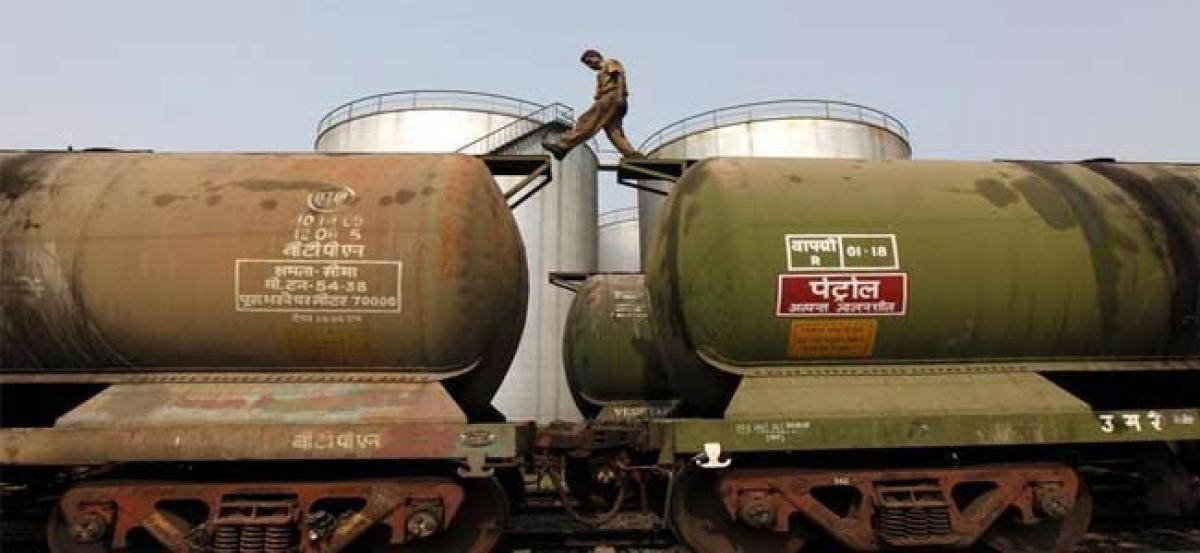Live
- AI Model Detects Residual Brain Tumors in 10 Seconds, Offers Real-Time Surgical Guidance
- Reliance and Disney Complete JV Deal to Strengthen Entertainment Presence in India
- UP Govt Agrees to Protesters’ Demand, PCS Exam to Be Held in One Day
- Trump’s Social Security Tax Promise Faces Hurdles: What Retirees Need to Know
- Strict Action Needed Against Attacks on Government Employees - Retired Employees
- Hyundai Motor India Limited Announces 2024 Edition of ‘Hyundai Always Around’ Campaign
- Minister for Environment, Forests, and Endowments Celebrates Karthika Pournami and Guru Nanak Jayanti
- World Quality Day: Hindustan Zinc Reaffirms Commitment to Superior Product Quality & Innovation
- Grand Kartika Purnima Celebrations at Nagar Kurnool’s Saraswati Shishu Mandir
- Children’s day celebrations, Karnataka remnisences on Nehru’s contributions
Just In

Indian state refiners will cut oil imports from Iran in 2017/18 by a fifth, as New Delhi takes a more assertive stance over an impasse on a giant gas field that it wants awarded to an Indian consortium, sources familiar with the matter said.
NEW DELHI: Indian state refiners will cut oil imports from Iran in 2017/18 by a fifth, as New Delhi takes a more assertive stance over an impasse on a giant gas field that it wants awarded to an Indian consortium, sources familiar with the matter said.
India, Iran's biggest oil buyer after China, was among a handful of countries that continued to deal with the Persian Gulf nation despite Western sanctions over Tehran's nuclear programme.
However, previously close ties have been strained since the lifting of some sanctions last year as Iran adopts a bolder approach in trying to get the best deal for its oil and gas.
Unhappy with Tehran, India's oil ministry has asked state refiners to cut imports of Iranian oil.
"We are cutting gradually, and we will cut more if there is no progress in the matter of the award of Farzad B gas field to our company," one of the Indian sources said.
Indian refiners told a National Iranian Oil Co (NIOC) representative about their plans to cut oil imports by a fifth to 190,000 barrels per day (bpd) from 240,000 bpd, officials present at the meeting said.
Indian Oil Corp and Mangalore Refinery and Petrochemicals Corp will reduce imports by 20,000 bpd each to about 80,000 bpd. Bharat Petroleum Corp and Hindustan Petroleum Corp will together cut imports by about 10,000 bpd to roughly 30,000 bpd, they said.
In turn, NIOC threatened to cut the discount it offers to Indian buyers on freight from 80 percent to about 60 percent, the officials added.
No comment was available from the Indian companies or NIOC.
Cutting imports from Iran amid an OPEC-led supply cut aimed at propping up the market exposes India's refiners to the risk of struggling to find reasonably priced alternatives.
"We expect that the market is currently undersupplied and that the draws in inventory are coming," U.S. investment bank Jefferies said in a note to clients this week, adding it expected crude prices of around $60 a barrel by the fourth quarter.
Despite this, Indian oil industrials said they saw no major impact from cutting Iranian imports, mainly due to their specific requirements.
"Their main requirement is lighter oil, and light oil will remain in oversupply despite OPEC cuts, as OPEC cuts are mainly medium heavy sour," said Ehsan ul Haq of KBC Energy Economics.
Prices of light crude have fallen recently, thanks largely to soaring output in the United States, which is not involved in the production cuts led by the Organization of the Petroleum Exporting Countries.
From April last year to February 2017, India imported 542,400 bpd from Iran, compared to 225,522 bpd a year earlier. Average oil volumes supplied by Iran over this period were the highest on record.
INDIA'S GAS PLAN
At the heart of the spat is that a group of Indian oil companies headed by Oil and Natural Gas Corp wants to develop Iran's Farzad B gas field.
Iran has yet to hand out a concession that would allow its development.
ONGC Videsh has submitted a $3 billion development plan to Iranian authorities to develop the offshore field estimated to hold reserves of 12.5 trillion cubic feet, with a lifetime of 30 years.
Under sanctions, Iran was banned from the global financial system, preventing the field's development.
India was one of a few countries still supplying Iran with goods, devising a complex payment mechanism to help Tehran access non-sanctioned items including medicines.
As new options have opened up for Tehran since the lifting of sanctions, Iran may now be awaiting better bids for Farzad B.
"They (Tehran) are playing hardball ... We don't see any forward movement on that (Farzad B)... So we have reduced (crude) imports," the Indian official said.

© 2024 Hyderabad Media House Limited/The Hans India. All rights reserved. Powered by hocalwire.com







